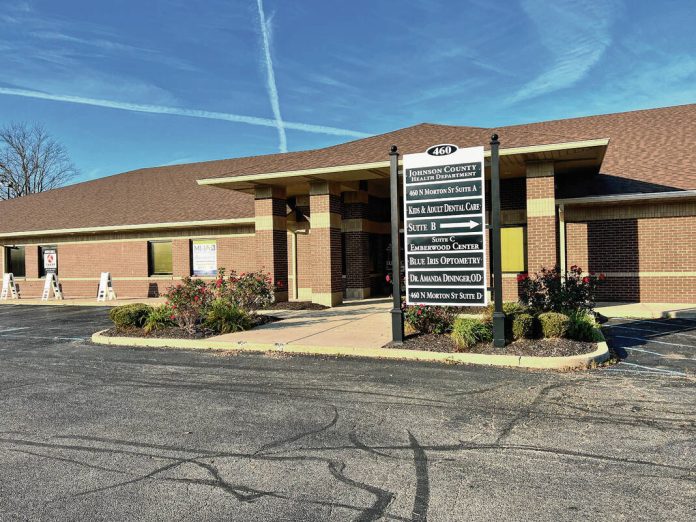Johnson County will not opt-in to receive new public health money from the state, at least for now.
The Indiana General Assembly, backed by Gov. Eric Holcomb, passed Senate Enrolled Act 4 earlier this year. With that came a line item in the budget to bolster funding for local health departments around the state. Lawmakers funded the legislation with $75 million in 2024, followed by $150 million in 2025.
The bill gives counties these additional funds in exchange for providing enhanced public health services and complying with reporting and metrics requirements, the Indiana Capital Chronicle reported. This legislation was in response to Indiana’s generally poor public health spending rating when compared to states across the country.
Funds will be split between all the counties that opt-in for a share of the money. Johnson County is eligible for between $1.5 million and $2.1 million for 2024 and between $3.1 million and $4.2 million in 2025, according to the Indiana Department of Health website.
County officials though say the local health department doesn’t need the extra cash right now, nor the strings attached to it. Johnson County is one of 22 counties in the state that have not opted to take the funding so far.
This was a collective decision made by the Johnson County Board of Commissioners and Johnson County Health Department officials.

“Our health department is already running 95% of what is required within this new bill,” Commissioner Kevin Walls said. “So that’s one of the reasons we dropped out.”
The Johnson County Health Department is already a “very efficient” and professional public health department, said Dr. Jefferson Qualls, county health officer. It’s already well-funded and provides many services the state says other health departments around the state lack.
Johnson County is in the top 10 healthiest counties in Indiana, according to data collected by the U.S. News and World Report. Qualls noted that, and the fact that Johnson County also ranks as one of the top wealthiest counties in the state per capita.
“That’s my perspective on it,” Qualls said. “And we’re not in the business of wasting government funds either.”
SEA 4 provides a list of “core public health services” to be provided by local health departments, including communicable disease prevention, sanitary inspections, tobacco prevention programs, access to immunizations, testing for STDs and STIs, child fatality reviews, partnerships with schools, different health screenings and more.
Johnson County’s health department provides all of those core health services, and is fully funded to do so with its own budget and different already-existing grants. These funds are also intended for health departments to expand on services such as a paramedicine program or an EMS task force, which Johnson County already has as well, said Betsy Swearingen, health department director.
The county is also already working on expanding mental health care, both in the health department and in partnerships with Johnson Memorial Health. The county is planning to build a behavioral health wing onto Johnson Memorial Hospital with funds from the federal American Rescue Plan Act.
“We’ve always taken the approach when people come to us about trying something different or adding a new program … we always from day one have moved forward on that,” Swearingen said. “I think these funds are to try to kickstart people and other health departments into doing stuff that we’re already doing.”
Public health remains important in Johnson County, Swearingen, Walls and Qualls said. One example of that is the construction of the new, larger health department building on Drake Road in Franklin. The new building will be another avenue for the department to expand its public health services, they said.
“There’s this stigma that if we don’t take this, then it looks like we’re not taking public health seriously. And I think that couldn’t be further from the truth,” Swearingen said.
County officials were told by the state that if they do not accept the public health funding, it will be split among other counties that do opt-in to the program. There are other counties that need more help with public health than Johnson County does, Walls said.
“We’re not greedy. I mean, I just think the consensus is we don’t need it. So why should we take it?” Walls said. “… It could be better utilized someplace else. That’s kind of the bottom line.”
Another concern among officials is how this new state public health program will take shape, and what strings would be attached to funding. Swearingen said she was concerned it could create more work and headaches for the health department when they already are providing these services in the first place. Growing programs and adding more employees requires planning, and also there needs to be people interested in taking the jobs the funding would add.

“There’s this misconception that if you throw $1.5 million at a health department that, boom, look, problems are solved,” Swearingen said. “That just doesn’t happen overnight.”
Swearingen hasn’t been one to back out of applying for grants, but taking this funding right now does not seem needed for Johnson County, she said. There is also no guarantee this funding is permanent, since state lawmakers write a new budget every two years. Swearingen said the county does not want to come to rely on these state funds, just to lose those dollars down the road.
“I never ever would ever be one to be like, ‘oh, let’s turn money down.’ I think maybe it’s not a turndown, maybe it’s just a ‘let’s wait and see.’” Swearingen said.
Opting out of the state public health funding now does not mean the county won’t consider it later, Walls said. A need may arise and they can apply for the money then, after the program is more established. County officials have until September this year to opt-in to receive 2024 funding and next year to get the 2025 funding.
“I’m not saying we’re not ever going to do it. But I’m saying right now currently, we’re not interested in doing it,” Walls said.





